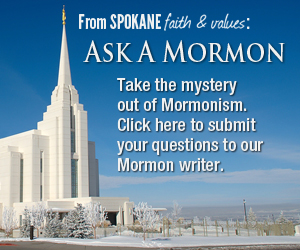Do you have a question about the Church of Jesus Christ of Latter-day Saints? Submit it online or fill out the form below.
Do you have advice on how to respond when people argue that Mormonism is a “cult”?

Getting back to your question, a lot depends on your relationship with the person, the setting in which the topic comes up, and the likelihood of a constructive conversation. Is it a random comment on your blog from a person on the Internet with a history of rude and dismissive remarks about individuals or other religions? It may be best to simply wish them well and not engage. Is it a sincere question from a good friend who heard something about Mormonism that doesn’t seem to fit with what she knows of you? By all means, have the conversation.
To the specific concern of Mormonism being called a cult, I’ve found that when a person deliberately uses an inflammatory word like “cult,” it often indicates a lack of interest in real conversation. The connotation of the word brings up images of mass suicides, brainwashing, violence and abuse. That’s a pretty offensive label to slap on anyone without hard evidence.
In my experience, that word is intended to shock, offend, demean and “other-ize,” not to open a sincere conversation with a goal of better understanding each other. When someone starts throwing the word “cult” around, I generally point out the disrespectful nature of the word and then, if they persist, step out of the conversation, just as I would if someone were using racial epithets or derogatory terms for LGBT individuals.
However, I’ve had some great conversations with friends who came to me concerned or confused about things they’d heard about the Church of Jesus Christ of Latter-day Saints, including the accusation that it’s a “cult.” If you feel that it could be a productive conversation, it helps to first ask what definition they’re using. In the most general sense, “cult” simply means “a particular system of religious worship.” Sometimes it helps to point out that pretty much every faith and belief system can be called a “cult” under that broad definition.
In common usage, however, “cult” sometimes seems to mean “any religion that has beliefs that make me uncomfortable, or that I don’t understand, or that are significantly different from what I believe.” Wikipedia – that fount of all knowledge — defines a cult as “a religious group or other organization with deviant and novel beliefs and practices.” But it goes on to point out, “whether any particular group’s beliefs are sufficiently deviant or novel enough to be considered a cult is often unclear, and thus establishing a precise definition of cults is problematic.”
It’s a pretty slippery slope. Let’s look at the word “deviant”, for example — who gets to decide what qualifies as deviant? How much difference does there need to be for a belief to be considered deviant from the norm – and, for that matter, who defines the norm?
So, if you feel it could be a positive discussion, try to pin down exactly what their concerns are so you can address those directly rather than the amorphous, poorly defined accusation of “cult.”
I’m going to end with a plug for Coffee Talk this upcoming weekend. The topic is the desensitization of language and how our words are important. The words we choose to use and the words we choose not to use can open up a beautiful dialogue that brings us together or they can erect walls that separate us further. Particularly in interfaith interaction, when we’re discussing and learning about beliefs and topics so close to people’s hearts, we should be especially careful to use words that will continue the conversation rather than shut it down.







OK, so there is a joke about cults:
Q: What’s the difference between a religion and a cult?
A: About 100 years.
There is some truth in this, depending (of course) in how we define our terms. I’ve always heard that a cult is defined as a small religious group centered around a charismatic leader (probably there are MUCH more rigorous definitions than this). By this definition, most religions started out as cults.
That said, I’m definately in the “Mormonism is a religion” camp. The whole debate is designed to de-legitmate Mormonism, which is unfair. Mormonism has an established cannon, a complex social heirarchy, and a wide range of traditions and rituals. If that doesn’t qualify it as a religion, what does?
[This commenter filled in the “Ask a Mormon” submission form instead of the comment form, so I’m going to post it below.
~Emily]
Emily, before I got to the last paragraph I was thinking, “Ooh! That’s a great topic for Coffee Talk! 🙂
I actually was taught, in my last denomination, that Mormonism IS a cult – the fastest growing cult in America.
I believe that teaching stems from a combination of fear (because that evangelical denomination is competing for the same “lost souls” as the Mormon missionaries are) and from a legalistic need to “be right” and therefore call all others “wrong.” But your article clearly collapses that line of thinking by pointing out that any belief system that differs from your own could easily be labeled a cult.
Another point that would be good for our Coffee Talk this Saturday, is that in using the word cult so widely, we diminish the harsh realities of cults that enslave people, ruin lives, and in some historic cases such as the Jonestown Massacre even result in mass murder.
Great piece! Thanks!